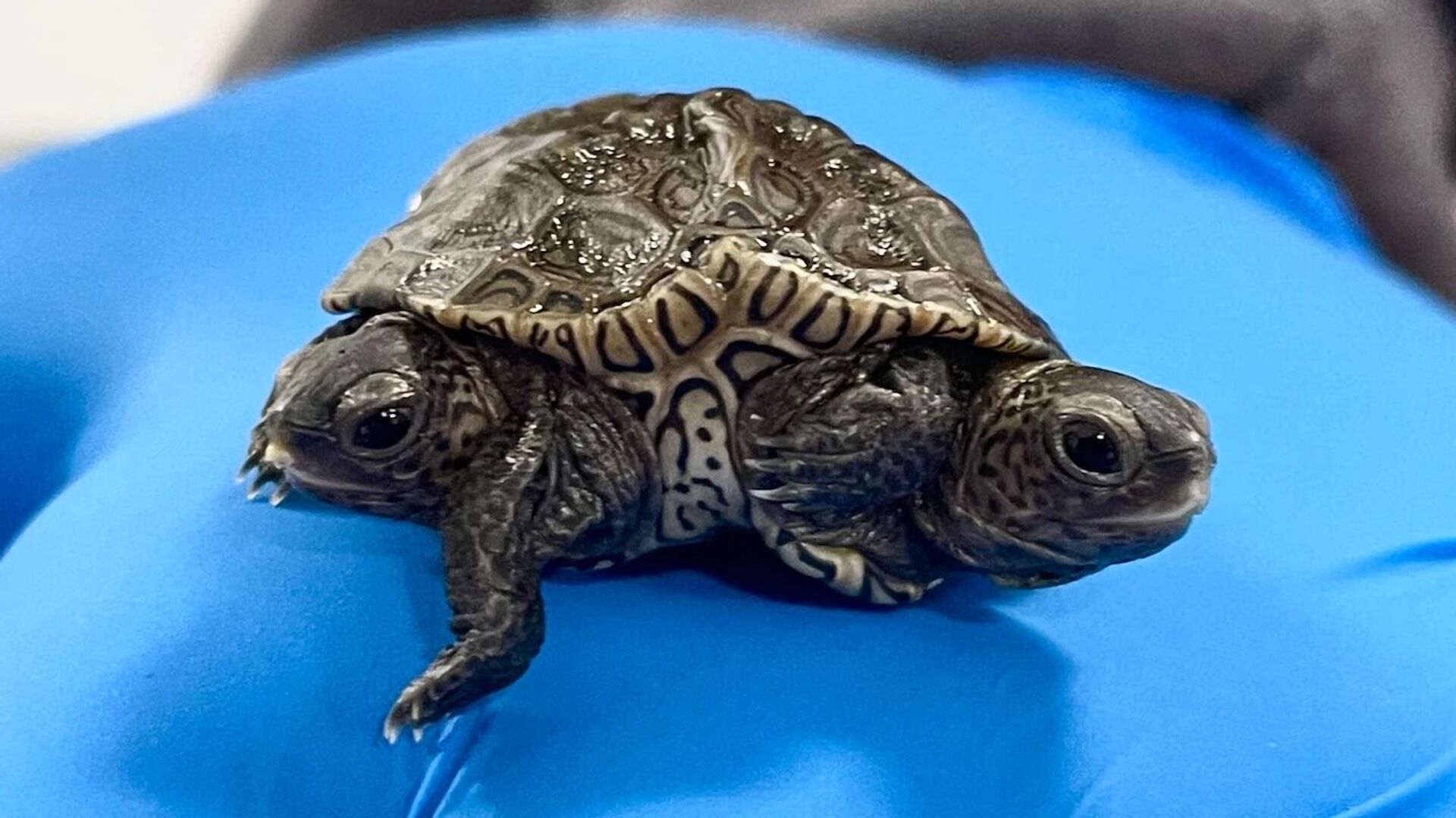https://sputnikglobe.com/20211014/rare-conjoined-turtles-with-two-heads-and-one-body-hatch-in-massachusetts-1089912579.html
Rare Conjoined Turtles With Two Heads and One Body Hatch in Massachusetts
Rare Conjoined Turtles With Two Heads and One Body Hatch in Massachusetts
Sputnik International
Interestingly, after their birth, the hatchlings got their nutrition from the same yolk sac. According to the Wildlife centre, the two babies are eating... 14.10.2021, Sputnik International
2021-10-14T11:17+0000
2021-10-14T11:17+0000
2023-04-21T10:42+0000
environment
scientists
reptiles
science & tech
https://cdn1.img.sputnikglobe.com/img/07e5/0a/0e/1089917739_0:136:1439:945_1920x0_80_0_0_5074d4131792e5784f1dd09e5f079c21.jpg
In a bizarre incident, conjoined turtles with two heads and a single body have hatched at a wildlife center in the state of Massachusetts, US. In a Facebook post, the New England Wildlife Center's Cape Cod branch shared the picture of this rare phenomenon and stated that the baby turtles are "very alert" and "active". The centre also said that similar to conjoined twins in humans, the turtles share parts of their body but also have some parts that are independent.In this case “they” have two heads and six legs. This rare birth of the baby diamondback terrapins turtles (Malaclemys terrapin) is a consequence of a condition called bicephaly, which can occur from both genetic and environmental factors that influence an embryo during development. Generally, animals with this condition do not survive for long. However, these "conjoined twins" are thriving. According to the X-ray reports, the babies have two spines that fuse together down the body. A barium study has revealed they each have separate gastrointestinal (GI) tracts. The researchers will perform CT scans on the babies once they get a bit older, to learn about their internal structures and organs.
Sputnik International
feedback@sputniknews.com
+74956456601
MIA „Rossiya Segodnya“
2021
Sushmita Panda
https://cdn1.img.sputnikglobe.com/img/07e5/05/12/1082926186_0:0:2048:2048_100x100_80_0_0_4474d0d7e27a36878eb8727832be74b4.jpg
Sushmita Panda
https://cdn1.img.sputnikglobe.com/img/07e5/05/12/1082926186_0:0:2048:2048_100x100_80_0_0_4474d0d7e27a36878eb8727832be74b4.jpg
News
en_EN
Sputnik International
feedback@sputniknews.com
+74956456601
MIA „Rossiya Segodnya“
Sputnik International
feedback@sputniknews.com
+74956456601
MIA „Rossiya Segodnya“
Sushmita Panda
https://cdn1.img.sputnikglobe.com/img/07e5/05/12/1082926186_0:0:2048:2048_100x100_80_0_0_4474d0d7e27a36878eb8727832be74b4.jpg
environment, scientists, reptiles, science & tech
environment, scientists, reptiles, science & tech
Rare Conjoined Turtles With Two Heads and One Body Hatch in Massachusetts
11:17 GMT 14.10.2021 (Updated: 10:42 GMT 21.04.2023) Interestingly, after their birth, the hatchlings got their nutrition from the same yolk sac. According to the Wildlife centre, the two babies are eating, swimming and gaining weight. The "twins" coordinate while swimming and coming back to the surface of the water for air.
In a bizarre incident, conjoined
turtles with two heads and a single body have hatched at a wildlife center in the state of Massachusetts, US.
In a Facebook post, the New England Wildlife Center's Cape Cod branch shared the picture of this rare phenomenon and stated that the baby turtles are "very alert" and "active".
"They” hatched from a protected nesting site in Barnstable and were brought to the hospital by the Barnstable department of natural resources for assessment," the Wildlife centre stated.
The centre also said that similar to conjoined twins in humans, the turtles share parts of their body but also have some parts that are independent.
In this case “they” have two heads and six legs.
This rare birth of the baby diamondback terrapins turtles (Malaclemys terrapin) is a consequence of a condition called
bicephaly, which can occur from both genetic and environmental factors that influence an embryo during development.
Generally, animals with this condition do not survive for long. However, these "conjoined twins" are thriving.
“They” have been in our care for just over two weeks and continue to be bright and active. It is impossible to get inside the heads of these two, but it appears that they work together to navigate their environment. We are taking this case day-by-day and are working to learn as much as we can about these two while they are in our care," the centre said in the Facebook post.
According to the X-ray reports, the babies have two spines that fuse together down the body. A barium study has revealed they each have separate gastrointestinal (GI) tracts.
The researchers will perform CT scans on the babies once they get a bit older, to learn about their internal structures and organs.


